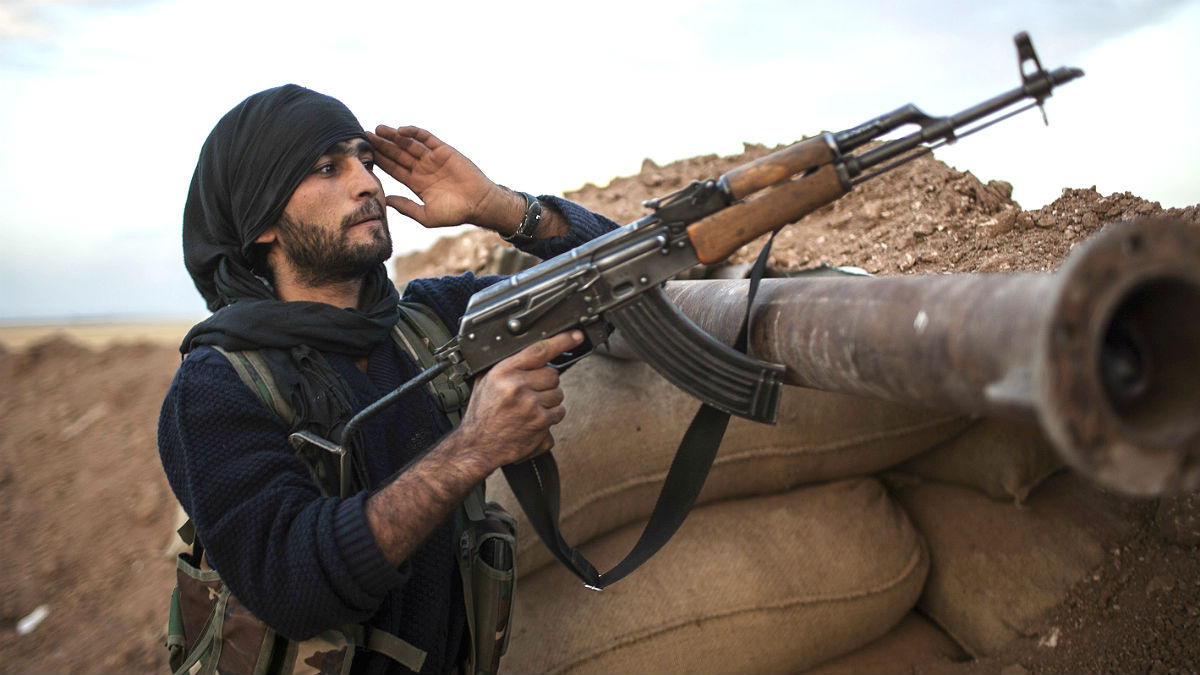Nato backs Turkey in fight against Islamic State in Syria
The alliance 'stands in solidarity with its ally', but plays down speculation that it could provide military support

A free daily email with the biggest news stories of the day – and the best features from TheWeek.com
You are now subscribed
Your newsletter sign-up was successful
Nato members have held emergency talks in Brussels to discuss Turkey's campaign against Islamic State militants and Kurdish rebels along its border with Syria.
The summit was called by Turkey under a clause allowing members to convene a meeting if their territorial security is under threat. It is only the fifth such request in Nato's history, according to the BBC.
"We stand in strong solidarity with our ally Turkey," said Nato Secretary General Jens Stoltenberg as the meeting got underway. And although Nato has played down the idea that it would provide air or ground support for Turkey's campaign in Syria, President Recep Erdogan suggested otherwise at a news conference on Tuesday, Reuters reports.
The Week
Escape your echo chamber. Get the facts behind the news, plus analysis from multiple perspectives.

Sign up for The Week's Free Newsletters
From our morning news briefing to a weekly Good News Newsletter, get the best of The Week delivered directly to your inbox.
From our morning news briefing to a weekly Good News Newsletter, get the best of The Week delivered directly to your inbox.
The meeting comes after Turkey began a bombing campaign against IS targets in Syria. It had initially been reluctant to get involved in the conflict raging across the border, but the government appeared to change its mind following a spate of violent attacks on Turkish soil.
But Islamic State has not been its only target. The Turkish army has also launched air strikes against the Kurdistan Workers' Party (PKK) and arrested hundreds of suspected members of the group.
President Erdogan has now officially called off a fragile truce with the Kurds, arguing that "it is not possible for us to continue the peace process with those who threaten our national unity and brotherhood".
Meanwhile, Washington and Ankara have agreed to establish an "Islamic State-free buffer zone" along the border, which could become a place of refuge for tens of thousands of Syrian refugees. Under the agreement, IS militants would be cleared from a 68-mile (109km) stretch west of the Euphrates River, officials say.
A free daily email with the biggest news stories of the day – and the best features from TheWeek.com
However, some have questioned whether Turkey is more interested in limiting Kurdish capabilities in Syria and Iraq than tackling Islamic State, reports Al Jazeera.
The BBC's Mark Lowen agrees, arguing that Turkey is only striking the jihadists "as cover for going after its real enemy: Kurdish militants".
"Ankara's reluctance to hit IS earlier, the argument goes, was actually a reluctance to help Kurds fighting IS militants," he says. "Now both can be bombed, Turkey is willing to get involved."
Turkey launches first air strikes against Islamic State in Syria
24 July
Turkey has bombed Islamic State targets in Syria for the first time after the terrorist group stepped up its cross-border attacks.
The air strikes hit three targets in the north of country, but the government insists the jets did not violate Syrian airspace.
Turkey also reached a milestone agreement with Washington, finally allowing US war planes to launch strikes from its air base in Incirlik after months of fraught negotiations.
This will allow jets to strike Islamic State targets with greater efficiency and increase the number of bombings and surveillance missions carried out. A senior US official told the New York Times that the agreement was a "game-changer".
Turkey has been reluctant to get involved in the ongoing conflict across the border, despite mounting local and international pressure.
"Having tried somehow to keep the conflict in Syria at arm's length, Turkey seems now to be being drawn slowly and reluctantly into more active engagement," the BBC's Jim Muir reports.
A number of deadly attacks appear to have forced the government to take action. The air strikes come just a day after a Turkish soldier was killed and five other were wounded by Islamic State militants.
Earlier this week, a suicide bomber with links to Islamic State killed more than 30 people in the border town of Suruc, prompting widespread protests calling on the government to do more to stop the violence spilling across the border.
Turkish police have since launched raids against IS militants across the country, arresting 251 people. But security forces are also after Kurdish PKK militants and radical leftists, "underlining the complexity of the challenges facing the country," says Muir.
-
 How the FCC’s ‘equal time’ rule works
How the FCC’s ‘equal time’ rule worksIn the Spotlight The law is at the heart of the Colbert-CBS conflict
-
 What is the endgame in the DHS shutdown?
What is the endgame in the DHS shutdown?Today’s Big Question Democrats want to rein in ICE’s immigration crackdown
-
 ‘Poor time management isn’t just an inconvenience’
‘Poor time management isn’t just an inconvenience’Instant Opinion Opinion, comment and editorials of the day
-
 Epstein files topple law CEO, roil UK government
Epstein files topple law CEO, roil UK governmentSpeed Read Peter Mandelson, Britain’s former ambassador to the US, is caught up in the scandal
-
 Iran and US prepare to meet after skirmishes
Iran and US prepare to meet after skirmishesSpeed Read The incident comes amid heightened tensions in the Middle East
-
 Syria’s Kurds: abandoned by their US ally
Syria’s Kurds: abandoned by their US allyTalking Point Ahmed al-Sharaa’s lightning offensive against Syrian Kurdistan belies his promise to respect the country’s ethnic minorities
-
 Israel retrieves final hostage’s body from Gaza
Israel retrieves final hostage’s body from GazaSpeed Read The 24-year-old police officer was killed during the initial Hamas attack
-
 China’s Xi targets top general in growing purge
China’s Xi targets top general in growing purgeSpeed Read Zhang Youxia is being investigated over ‘grave violations’ of the law
-
 Syria’s Islamic State problem
Syria’s Islamic State problemIn The Spotlight Fragile security in prison camps leads to escape of IS fighters
-
 Panama and Canada are negotiating over a crucial copper mine
Panama and Canada are negotiating over a crucial copper mineIn the Spotlight Panama is set to make a final decision on the mine this summer
-
 Trump backs off Greenland threats, declares ‘deal’
Trump backs off Greenland threats, declares ‘deal’Speed Read Trump and NATO have ‘formed the framework for a future deal,’ the president claimed